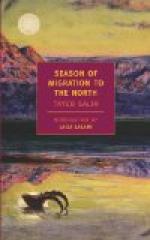We have not walked with Miss Gordon for half an hour among the tepees when we discover the secret of her cheeriness and content. Our happiness consists not in our havings but in our attitude of mind. The world is divided sharply into two classes. The classes are not the white and the black, the good and the bad, the sheep and the goats, as the orthodox would have us believe. We are all good and bad, not black or white, but varying shades of grey. Neither are we sheep or goats, but moral alpacas, all of us,—something between a sheep and a goat. But no less are we divided into two clear-cut classes. Each of us puts himself of his own volition into the class of the self-centred, or the self-forgetting, and in the act marks himself as happy or unhappy.
As Miss Gordon lifts the tent-flaps, smiles greet her from every home. The baby in the moss-bag is handed up for her inspection, and old blind Paul Cree, the Chief, knows her moccasined step, and rises on his elbow from his couch of spruce-boughs to greet her eagerly and salute any that she may present as friend. The Chief is in his ninety-sixth year and depends upon chance visitors for his companionship and food. Yet an assured air of dignity shows that Paul Cree is aware of the respect due to the Chief of the McMurrays. He addresses us in Cree, which Miss Gordon translates. “I am delighted that ladies have come such a long distance on purpose to see me. The white man is my friend. I think all white women must be good. Their mothers have taught them to be kind to old people. I am sorry I am blind. Be glad that you can see the water, the sky, the birds and flowers and the faces of little children,” and the tired old head sinks on the fir-boughs and we are dismissed. “Be glad you are alive, and use that sight while you have it.” It is the advice given by that other strong man laid on his back, Carlton in the Winnipeg Hospital.
We are joined by Paul Cree’s brother. He has long hair, and wears a pair of pince-nez as an English gallant wears his monocle—merely for effect, for there is nothing the matter with the vision of those sharp eyes. In one tepee a young mother is reading a service book of the Roman Church to her little girl of five. Across the plateau under the shadow of the hill we enter a camp where Miss Gordon has a patient with an injured hand. The cut is ugly and is surrounded by proud flesh, and we find that twice a day Miss Gordon leaves her household work and her little store to go across and dress this wound.
When a schoolboy takes to his bosom a fidus Achates, the first thing he does is to offer to show his birds’ nests; so Miss Gordon introduces us to her find,—nests of the Gambel sparrow. We take two views, one of a nest of five eggs and another of the nesting mother.
During the past winter Miss Gordon has fed the Indians in families, as they had “made little fur,” entertaining them as courteously as you would your special friends at an afternoon of pink tea and pink thoughts. Visiting the sick, trading fur, cultivating her little garden, bringing wolf pups and bear cubs up by hand, thus this plucky woman passes her days. It takes the adaptability and dour determination of a Scot to fit into this niche. Your Irishwoman would last in McMurray just about three days.




